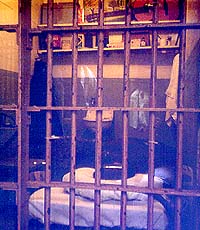
| |||||||
December 23, 1999
 Hague - concentration camp for Serbs |
By Prof. Dr. Kosta Cavoski
Professor Kosta Cavoski, an eminent Yugoslav law scholar, holds Ph.D. from Harvard University. He has taught at Theory of Law at University of Belgrade.
If the start or the case of the Prosecutor vs. Djordje Djukic disgraced the International Criminal Tribunal at The Hague, a more serious examination of the manner in which the Tribunal was founded and its working Rules of Procedure and Evidence would also convince us that the failure was not in the least accidental. Moreover, it could have been expected when the Security Council Resolution 808 of 22 February 1993 was issued. In spite of the fact that the Resolution expressed the intention to found an international tribunal for the prosecution of persons responsible for committing serious violations of international humanitarian law on the territory of the former Yugoslavia since 1991, the Security Council did not feel the need to provide a legal basis for its establishment.(10) The reason for this omission is simple: the existing legal system of the UN does not provide a legal basis for it, nor can there ever be one. Half a century has passed since the founding of the UN, and its main political and executive body, the Security Council, has never assumed the right to found a tribunal since court jurisdiction rests on international treaties as a result of the absence of a universal legislative organ. This was clearly stated by the UN Secretary General in his report no. S/25704 (section 18) of 3 May 1993 when he said: "The approach which in the normal course of events would be followed in establishing an international tribunal would be the conclusion of a treaty by which the member states would establish a tribunal and approve its statute. This treaty would be drawn up and adopted by an appropriate international body (e.g. the General Assembly or a specially convened conference), following which it would be opened for signing and ratification. Such an approach would have the advantage of allowing for a detailed examination and elaboration of all issues pertaining to the establishment of the international tribunal. It would also allow the states participating in the negotiation and conclusion of the treaty to fully exercise their sovereign will in particular whether they wish to become parties to the treaty or not".
- "Merciful" hotel of Carla del Ponte
- Serb Hunting Continues - After the Arrest of General Stanislav Galic
- Avoiding the truth by resorting to more lies
- Carla Del Ponte fails to discover mass graves in Kosovo and Metohija
- Investigation of Hague Tribunal is a parody
- Protests because of arrest of General Talic
- Colo: The Hague Tribunal serves USA
- Charges from The Hague part of NATO's campaign - victims announced guilty
- Louise Arbour, NATO lawyer in The Hague
- Joint manipulations of NATO and the International Tribunal in the Hague
- Blewitt admits Delalic's acquittal mistake
- Evidence about the Killings of Drljaca and Gagovic
- Tribunal is a framework for political goals of the powerful
- Legal and moral credibility of the Tribunal in Hague
- Spectacles of Louise Arbour
- Reserves towards Hague tribunal justified
- General Krstic pleads not guilty
- General Krstic before Hague Tribunal
- Infringement of SFOR competence and Dayton Accord
- Material on Alija Izetbegovic's responsibilities completed
- Three convicted, one acquitted
- Butchers from Celebici
- Stevan Todorovic in the Hague prison
- Knezevic protests because of Kovacevicev's death
- Problems in the relations of FR Yugoslavia and the Hague Tribunal
- Findings of the Hague Tribunal Investigation of the Circumstances of Slavko Dokmanovic's Death
- SFOR Arrests Men by Mistake
- Responsibility of the International War Crimes Tribunal
- Slavko Dokmanovic Dies Under Unclear Circumstances
[ Home | Encyclopedia | Facts&Figures | News ]
Copyright © 1998, 1999, 2000 Ministry of Information
Email: mirs@srbija-info.yu